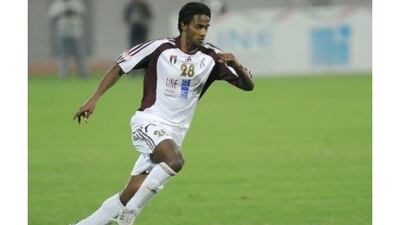For a man who speaks two languages fluently, it is perplexing to hear that Eisa Ahmed al Marzouqi has been cast into the international wilderness because of a communication issue.
The Al Wahda defender appeared on the cusp of establishing himself in the UAE national team in 2008 when he was called up by Bruno Metsu for a friendly tournament in Ghana in 2008.
But just a few months later he failed to make the national Under 20 team after missing a summer camp in the capital because of an apparent miscommunication.
"I was requested to join the youth national team's training but there was no formal word from my club," al Marzouqi said. "Later I read a news article in the Arabic dailies that I was dropped for not attending the training. I wasn't considered for the national team thereafter."
Basheer Saeed, the central defender who plays alongside al Marzouqi at Wahda, feels Srecko Katanec, the national team coach, would be well-advised to consider ending the defender's exile.
"He is dynamic player full of energy," Saeed said. "He has skills and agility, and this season he has sealed his place in the first XI. Playing by his side, I know I have a teammate I can always rely on for support because of his abilities as well as the commitment."
Saeed knows a thing or two about defending, having played more than 150 times for Wahda and having pulled on the national jersey 56 times. He believes al Marzouqi, 24, and Hamdan al Kamali, the 21-year-old centre-back, could form the backbone of the defence for club and country for years.
"They are already established as the regulars in the club's new 4-4-2 format and are the best two young defenders to come out from the age-group level," Saeed said.
If al Marzouqi's family had not moved to the capital when he was 13, he could still be playing for Al Nasr, now under the leadership of Walter Zenga, the former Italy goalkeeper.
"I spent around three years at Al Nasr," al Marzouqi said. "My father took me to Al Wahda. I made it to the club's Under 16 team and made a few trips abroad. My father was the manager of that team. He was also my mentor and coach."
Al Marzouqi is referred to around the training ground and dressing room as "Eisa Santo" as a tribute to his father, Santo, who is a former Wahda stalwart.
"Eisa is one of the popular persons in the team, a guy who can bring a lot of fun and laughter," Mutaz Abdulla, the goalkeeper, said. "He is also a 100 per cent team man on the pitch and a strong player to have in the defence. He is also one of the fittest guys in the team and that gives me, as a goalkeeper, a lot of confidence that he will fall back to cover."
Wahda clearly have faith in their Dubai-born defender, handing him a contract until 2015 after he played almost every game in his debut season in 2006/07. He played nearly every game the following season before a serious knee injury ruled him out for more than six months.
During that dark period, he drew strength from his close-knit family. He is the third of seven boys. Talal and Marwan, his older brothers, gave up football for jobs, as did two of his younger brothers, Abdulaziz and Abdullah. However, Mohammed, 12, and Rashid, 11, are showing signs of following in Eisa's footsteps; they are part of the Wahda academy.
"My brothers have ventured out for jobs but my ambition is to be a successful businessman," al Marzouqi said. "But right now all my attention is to play for my club and hopefully represent the country in the game that I love and a game that has given me so much in return."
Should he carve out a prolonged career as a footballer, al Marzouqi will have his father to thank.
"My father's influence has been great," he said. "He has helped as a mentor and a coach when I got more serious in pursuing a career in football at Al Wahda."
Al Marzouqi also paid tribute to the likes of team manager, Abdulla Saleh, and players Ismail Matar, Haider Ali, Abdulraheem Jumaa, Saeed and Fahed Masoud for his development at Wahda.
"Everyone treats me as an equal," he said. "Everyone in the team is my best friends and they have all helped me to improve my game."
Wahda have needed to draw on their inner strength during what has been a frustrating season. They provided a limp defence of their title, failed to win a trophy and are now struggling to finish in the top three in the Pro League.
Al Marzouqi said Wahda's participation as the host team in the Club World Cup (CWC) in December was "a huge distraction".
"We got our priorities mixed up with so many competitions to play," he said. "We didn't really focus on one single tournament. The CWC was a huge distraction. Our focus from the time we won the league was on the CWC.
"We were made to believe we were representing the UAE. We have a strong team on paper and all our fans ask this question why we haven't done well this season.
"It is quite frustrating when our own fans ask us to explain the reason for the poor record we have had this season."


